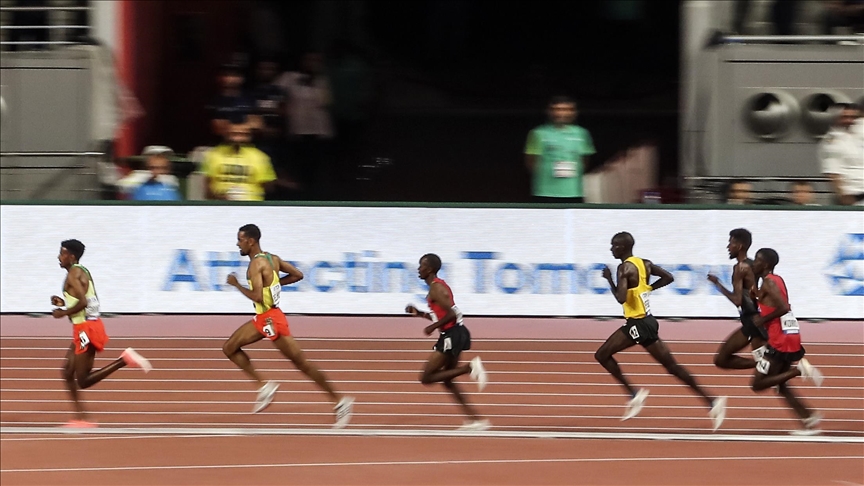
On Wednesday, the Athletics Integrity Unit (AIU) revealed that a disciplinary tribunal had upheld Rhonex Kipruto’s suspension, suspending the Kenyan distance star for six years for Athlete Biological Passport (ABP) irregularities and disqualifying all results from September 2, 2018 to May 11, 2023. Kipruto’s 10,000-meter bronze medal from the 2019 World Championships, as well as his 10k road world record of 26:24 set in Valencia in January 2020, will be removed unless he successfully appeals his case to the Court of Arbitration for Sport (CAS).
Kipruto, who has maintained his innocence since the AIU charged him in May 2023, has yet to say if he intends to appeal the case to CAS. The full disciplinary tribunal ruling is available here.
Kenya is experiencing a doping pandemic, and Kipruto is the second high-profile athlete to be sanctioned in the previous month. In a very similar scenario, the AIU banned Rodgers Kwemoi on May 17. Both guys were successful at a young age (Kwemoi was the 2016 World U20 10,000-meter champion; Kipruto won the same title two years later), but both were suspended for ABP infractions. Furthermore, both men’s bans were increased from four to six years owing to “aggravating circumstances” — specifically, the AIU decided they drugged regularly in the run-up to key contests, including the Kenyan Olympic trials in 2021. Kipruto and Kwemoi would go on to make up two-thirds of Kenya’s roster for the 2021 Olympic 10,000-meter final.
Kipruto’s story is especially notable given his age — at 24, he is well into his athletic prime — and the identity of his coach, Brother Colm O’Connell, the renowned Irish missionary who mentored David Rudisha to two Olympic 800-meter gold medals. Kipruto was the first of O’Connell’s athletes to be accused with doping throughout his 40-year coaching career, and O’Connell defended him last year, describing him as a “clean athlete.”
Kipruto went to tremendous measures to prove his innocence, including undergoing a painful bone marrow biopsy to check for genetic or physical issues. He also carried out a seven-week research in which Kipruto alternated and compared urine samples collected during weeks of abstinence with those collected during weeks of severe alcohol use to determine whether his drinking had contributed to the irregularities in his ABP. His firm, Ikaika Sports, has even built a website that details Kipruto’s full defense, including explanations from the expert witnesses he brought in his hearing. This kind of vigour and transparency in the appeal process is uncommon, even in the most high-profile doping cases.
Nonetheless, the disciplinary tribunal was unconvinced, noting that, while Kipruto’s team proposed several possible explanations for Kipruto’s abnormal results, including alcohol use and three separate hematological disorders, they were unable to connect those explanations to the specific abnormal blood values in Kipruto’s ABP profile.
“The Athlete’s Expert Team have neither presented a specific diagnosis nor an explanation as to how the irregularities in the Passport can be ascribed to the causes they have assigned,” the tribunal stated in its ruling. “Even after months of research, it appears that the Expert Team is unable to produce any substantial conclusions that could answer the pertinent questions. The Expert Team’s statements raise doubts, which speak for themselves.
Ikaika Sports responded immediately to the decision with its own nine-page news statement, with Kipruto’s agent Davor Savija advocating for more active deterrence in ABP cases.
“We request that the industry debate an alternative in which flagged samples are disclosed early and athletes are questioned for medical, training, and lifestyle answers in real time,” Savija stated. “If you are caught speeding in a car, the police will confront you nearly immediately, rather than after a specific number of comparable speeding episodes.”
Savija said that Kipruto must evaluate various considerations before determining whether to appeal his case to CAS.
“My advise to Rhonex has been consistent throughout this process: follow the lead of the legal and scientific experts,” Savija stated. “In terms of a prospective CAS appeal, my suggestion to Rhonex is to wait for upcoming genetic testing to come in and then have legal and scientific teams assess the issue further in light of these new testing results and the Decision.
“I am aware of the spiritual, psychological, and financial weight that all of these medical investigations have imposed on Rhonex, and any appeal to CAS must take these huge problems into account.”
Leave a Reply